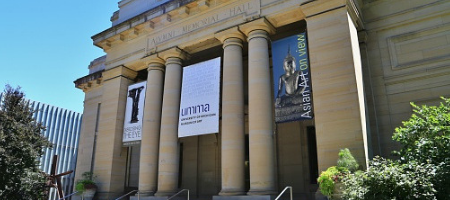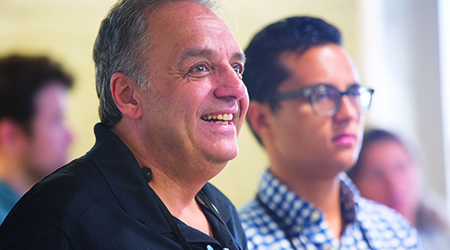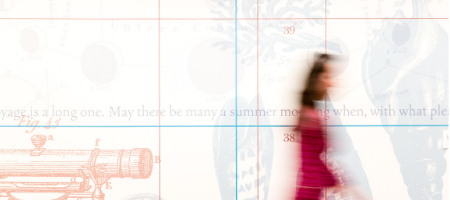In this newsletter, we highlight how these projects are strengthening the structure and strategic directions of both art museums and libraries. We are also continuing our research into how the liberal arts have an impact on student success–in college and beyond. I’m excited to take a moment to share updates on some of this work, and hope that you’ll find time to send your thoughts and feedback.
Sincerely,

Catharine Bond Hill
Managing Director, Ithaka S+R
Delving into the value of the liberal arts
Thanks to a grant from The Andrew W. Mellon Foundation, we have embarked on a new study on the value of a liberal arts education. As part of this research, we will describe the features that define a liberal arts education and determine whether these features are associated with positive outcomes for students — such as retention, graduation rates, and future earnings. This project deepens our earlier research on the economic costs and benefits of a liberal arts education.

Future directions for library consortia
To effectively serve their faculty and students, academic libraries have collaborated together to achieve greater negotiating power, more efficient distribution of collections, and stronger systems and services than any single library can provide on its own. For over a century, academic libraries have generated cross-institutional scale by forming consortia and other trust networks. But have these collaborations evolved to keep pace with emerging needs and technology? In a new issue brief, sponsored by ExLibris, we look at how libraries — and consortia — can optimize their work together to ensure that they achieve the scale needed to support their communities.

New initiatives with art museums
In 2019, we are broadening our work in the museum sector through three projects:
A survey of art museum directors. With funding from the Samuel H. Kress Foundation, we are working with the Association of Art Museum Directors (AAMD) to survey their members about critical issues facing this sector. Building on the extensive expertise we’ve gained through our triennial library directors survey, we will examine the strategic directions of museum leaders, their leadership practices, their current and expected resource allocations, and perceptions their about digital infrastructure and deaccessioning materials.
A study of the organizational structure of art museums. With support from AAMD, we will share our findings from 20 interviews with museum directors and our analysis of over 80 museum organizational charts through a publicly available report.
A study of libraries and museums within colleges and universities. With funding from The Andrew. W Mellon Foundation, we will examine the ways libraries and museums collaborate to maximize the use of primary source materials in teaching and research, and how those relationships could be further developed to serve the missions of their host institutions.

Three questions for Giuseppe Basili
Giuseppe “Seppy” Basili is the executive director of the Jack Kent Cooke Foundation (JKCF), a foundation dedicated to advancing the education of exceptionally promising students who have financial need. In this interview, Basili addresses how JKCF’s mission has evolved, what new initiatives it is undertaking, and the challenges the foundation faces as it seeks greater access to higher education for high-achieving, low-income students.
1. You’ve been with the Foundation for many years. Can you tell us how you’ve seen the Foundation’s mission evolve since you joined?
The Foundation is continuing to research strategies and tactics for practitioners. Our most recent report, “Persistence”, used National Student Clearinghouse data to demonstrate that community college transfer students thrive at selective four-year institutions. We’ll be producing more projects like this, through our internal research team as well as partners like Ithaka S+R and Two Year First Year, who we collaborated with on “First-Year Student Support”. A recent project on the quality of financial aid award letters, which we sponsored for Aspire and New America, has already inspired a number of schools to change the way they communicate this information.
Continue reading the rest of the interview on our blog
In the News
March 19, 2019
Elite Colleges Empower First-Generation Students to Succeed Just By Letting Them Enroll. They Must Admit More of Them
Richard Whitmire, The 74
March 17, 2019
Should All College Admissions Become Need-Blind? YES: Ending ability to pay as an admissions factor will restore trust in higher ed
Catharine Bond Hill, The Wall Street Journal
March 11, 2019
A Call for Policy Changes to Improve Access
Scott Jaschik, Inside Higher Ed
March 7, 2019
Is the Value of the Big Deal in Decline?
Roger C. Schonfeld, The Scholarly Kitchen
February 15, 2019
The Economic Gains (Yes, Gains) of a Liberal Arts Education
Scott Jaschik, Inside Higher Ed
February 7, 2019
Amazon Sells Way Fewer Books To Academic Libraries Than People Think
Adam Rowe, Forbes
January 28, 2019
Museums Have Grown More Diverse, New Study Says
Sara Aridi, The New York Times
January 10, 2019
Report Examines Improving Higher Ed Access for Veterans
Lois Elfman, Diverse Issues in Higher Education
